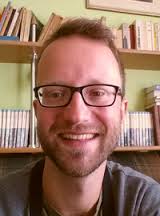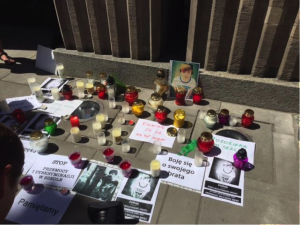Poland is stepping up the fight against hate
By Piotr Godzisz
For the first time, the Polish government agrees that people targeted because of their sexual orientation, gender identity or disability deserve the enhanced protection purportedly offered by hate crime laws. From the point of view of scholarship, the on-going debate provides some interesting insights on the internationalization of anti-hate policies, identity politics and protected characteristics.
Victim of physical and verbal harassment based on his “unmanly” appearance, Dominik Szymański, a 14-year old junior secondary school student from Bieżuń, Poland, committed suicide in May 2015. His death sparked a public debate in the country and prompted the Minister of Education to explicitly condemn homophobia in schools for the first time. Photo credit: Facebook page of Campaign Against Homophobia.
The decision of the Sejm subcommittee (Sejm is the lower chamber of the Polish parliament) to return to the bills aimed at proscribing hate crime, which were introduced in 2012 and last discussed over a year ago, was likely prompted by the advocacy work of LGBT and generalist human rights groups. Three factors likely helped their work: the recent recommendations from the European Commission against Racism and Intolerance (ECRI); the upcoming parliamentary elections; and the suicide of a teenager who was a victim of physical and verbal harassment based on his “unmanly” appearance.
In its fifth report on Poland, published in June 2015, ECRI emphasized the need to provide sufficient protection from hate speech and violence targeting LGBT people as well as people with disabilities. For this reason, ECRI stressed the need for a comprehensive response to hate-motivated incidents, including data collection and monitoring mechanisms, training of the criminal justice personnel, and amending the criminal code in order to include sexual orientation, gender identity and disability next to already protected grounds, i.e. race, national and ethnic belonging, political affiliation and religion. What is worth noticing is that the recommendations from ECRI did not come out of the blue. They are largely based on those included in the shadow report prepared by a group of NGOs, some of which have been advocating for the inclusion of gender, sexual orientation, gender identity, disability and age for years (ECRI does not recommend inclusion of gender and age). It seems, however, that, while the civil society groups’ calls were strong enough to put the issue on the parliamentary agenda (the role of two LGBT members of parliament being crucial in the process), they lacked the power necessary to convince the Ministry of Justice (MoJ) to support the bills. Now, it seems, the authority of ECRI has contributed to transforming “ignorable” demands of minority groups into subjects of international queries. I will come back to this argument.
The second factor which likely contributed to the decision to go back to the bills previously put on a back-burner is the upcoming end of term of the parliament. While relatively conservative over the past eight years, in the last few months the Civic Platform (PO) government supported a number of socially progressive initiatives. In effect, laws on violence against women and in vitro fertilization have been passed, while the bill on gender recognition, which passed in the Sejm, awaits the decision of the Senate. At the same time, Adam Bodnar, a long-term human rights activist, known for his liberal views, has been nominated to be the next Ombudsman. In the eyes of observers, by making socially progressive decisions, the PO has tried to win over left-wing voters, who have in recent times struggled to find a party that represent them.
The last factor which can be, at least partially, associated with the decision to come back to the bills is the suicide of a teenager, in May of this year, who was a victim of physical and verbal harassment based on his “unmanly” appearance. According to the prosecutor, the 14-year old was called a “faggot” for wearing skinny jeans and doing his hair. His death prompted a quick reaction from civil society, which accused the government of turning a blind eye on the problem of homophobia in schools. Thanks to the efforts of the Campaign Against Homophobia and the Society for Anti-Discrimination Education, the Minister of Education (MoE) for the first time explicitly condemned homophobia in schools. A representative of the MoE was also present, for the first time, at the meeting of the subcommittee last month when the amendments to the hate crime laws were discussed.
Also present, and also for the first time, was the representative of the Ministry of Interior (MoI). Responsible for police training, data collection and monitoring, the MoI has been implementing a comprehensive approach to combating hate crime for years. This has been done in co-operation with civil society and international organizations, such as the OSCE Office for Democratic Institutions and Human Rights (see, for example, the comments of the Polish government included in the ECRI report, p. 45). For this reason, even though absent from the criminal code, sexual orientation, gender identity and disability are included in the operational definition of hate crime used for the purpose of police training, data collection and monitoring.
The MoI’s approach is in line with the National Anti-Discrimination Programme 2013-2016 (PDF in Polish), in which the government agreed to “enhance the level of legal protection of groups vulnerable to discrimination.” It is also coherent with the government’s international declarations (see, the comments regarding paragraphs 28 and 47 of the ECRI report, p. 51). What is therefore surprising is the official stance of the MoJ towards the bills, which, until recently, was negative, and now shows only lukewarm enthusiasm. Expanding the protection to cover new groups would, in the opinion of the MoJ, change the ratio legis of the provisions, which were introduced in order to prevent inter-group conflicts. But while this change was unacceptable three years ago, it now seems possible.
In the MoJ’s explanations during the subcommittee’s session, ECRI’s recommendations seem to be an important factor in favour of expanding the protection to cover sexual orientation, gender identity and disability. It is, however, unclear, how the groups should be protected. There is an on-going (and dangerous), discussion whether the grounds should be listed specifically, or whether they should be included in a “cover-all” term, such as “natural or acquired personal characteristics.” The argument in favour of the latter is that the choice of the new groups is “arbitrary”, and that other groups which are marginalized, such as homeless people, will continue to be excluded (an interesting point in the light of the on-going academic debate on who should be protected by hate crime laws – see, for example, Chakraborti and Garland (2012), Garland and Hodkinson (2014) and Mason (2014)). In the opinion of the advocacy groups, however, passing the law with the descriptive format will hinder the effectiveness of policing, prosecuting and sentencing of hate incidents (see the comments about Bill no 1078 in the shadow report). At the same time, it may impede data collection and monitoring, which is an important tool in combating hate-motivated violence (see ODIHR, 2014; and FBI, 2015).
Another issue which is interesting from the point of view of protected characteristics is the civil society groups that sponsor the bills. Here, the Polish experience seems to depart (or learn) from that in the Western countries. For example, in the US or the UK, each minority group would typically advocate for its members only (for example, the gay and lesbian charity Stonewall UK only recently has become trans-inclusive), while also seeking to build coalitions with other groups (see, for example, Jennes and Broad, 1997). In Poland, even though the bills originate from LGBT groups, next to sexual orientation and gender identity they include also gender, disability and age. After being introduced in parliament, the bills received support from women’s rights and generalist human rights organizations. What is missing in the coalition, however, are minority organizations representing rights of people with disability and elderly people. This caused the critique of the bills in the Sejm, where some MPs accused LGBT organizations of “hiding behind the smokescreen” of protection of elderly and people with disability. So why do LGBT people advocate for other groups? The answer seems to be in the view that (1) the best way to combat intolerance is to do it comprehensively; and (2) by advocating not only for LGBT rights, the coalitions gain more legitimacy. This approach would be consistent with other aspects of the work of LGBT groups in Poland. For example, the Warsaw pride event is called Equality Parade and advocates for the rights of people with disabilities and animal rights. It also shows that Polish LGBT organizations have done their homework by learning from the experience of Western advocacy groups.
Lastly, in the debate about the amendments, the issue of hate speech visibly overshadows the issue of hate crime. This causes a danger that the laws, if passed, could address derogatory speech targeting the new groups, but not the actual crimes, such as murder, theft or property damage. In this regard, the discussion is about simply adding new grounds to the existing, historicized articles criminalizing hate speech, threats and violence. From the point of view of responding to hate crime, as well as data collection, it would be good if the country considered a more comprehensive approach, and, for example, introduce substantive offences (or penalty enhancements) for murder, property damage, theft, arson, vandalism etc. Implementation of a plug-in in the general part of the code, providing for a penalty enhancement in other provisions, would ensure that each time a bias motivation is found during investigation, the prosecutors can push for more severe sentences. This, however, has not been part of the discussion so far.
***
Some of the above points, particularly the reluctance to recognize LGBT as a group deserving of the enhanced protection, as well as the historicized understanding of the provisions on hate speech and targeted violence, will be discussed in greater detail in the chapter by Piotr Godzisz and Dorota Pudzianowska in the forthcoming book The Globalisation of Hate: Internationalising Hate Crime? (ed. by Mark Walters and Jennifer Schweppe, OUP).
About the author: Piotr Godzisz is a PhD candidate at University College London. His academic work examines the government response to hate crimes based on sexual orientation in Poland. He is a member of the Council of Europe pool of experts on sexual orientation and gender identity rights and a member of the LGBTQ Research Network at UCL. He also co-operates with civil society and international organizations working in the field of intolerance and hate crime.


